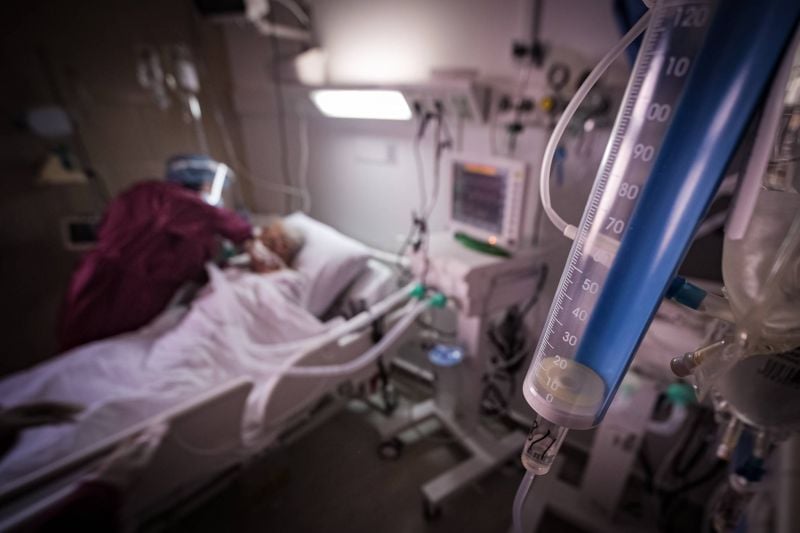
A health care worker treats a COVID-19 patient at Sibline Governmental Hospital. (Credit: João Sousa/L’Orient Today)
BEIRUT — Hospitals continued to struggle under the strain of a weekslong explosion of COVID-19 cases Saturday as residents hunkered down under stay-at-home orders meant to curb the disease’s spread.
The country witnessed 52 deaths Saturday, bringing the death toll to 2,280, while 4,176 tested positive for coronavirus, according to the Health Ministry.
Since the year began, 95,135 people have tested positive for COVID-19, representing over a third of all of Lebanon’s cases since the virus appeared in the country eleven months ago.
The surge has flooded hospitals, filling 895 ICU beds as of Saturday. According to the World Health Organization, the country’s total ICU capacity was 967 beds as of the night before, meaning most ICUs were full or near full.
The situation at Lebanon’s leading center for treating COVID-19 patients, Rafik Hariri University Hospital, remained “arduous and miserable,” said Hussein Kataya, the nurse in charge of the Beirut hospital’s coronavirus emergencies.
With no space available in regular and ICU COVID-19 wards, the hospital continues to treat coronavirus patients in its emergency room, which is not properly equipped to handle the virus.
Other hospitals across the country have also reached maximum capacity.
In the northern city of Tripoli, a spokesperson for Haykel Hospital said, “We are full at most times, and coronavirus patients are being treated and sleeping in ER beds.”
Like RHUH, the hospital’s ER is not adequately equipped to treat critical COVID-19 cases, she added.
At Baalbeck Governmental Hospital in the Bekaa Valley, all ICU beds are occupied, but several regular COVID-19 beds are still available to treat patients, according to director Abbas Shukr.
Aiming to restrain the alarming surge in hospitalized COVID-19 cases, authorities announced a strict 24-hour countrywide lockdown on Jan. 13, which was extended this week until Feb. 8.
While many residents stayed home Saturday, the country witnessed several small protests against the restrictions.
Protesters blocked the highway leading north from Tripoli with trucks, while another group blocked the highway south to Beirut with stones and other obstacles next to Tripoli’s Palma Bridge.
In the city itself, protesters also blocked the roundabout at Al-Nour Square, a central transit hub.
In the southern city of Saida, a group blocked the Elia Square intersection, the state-run National News Agency reported.
Protestors vowed to intensify their demonstrations if the lockdown continues, as many rely on work outside the home to cover their living expenses.
Over the past year and a half, residents’ purchasing power has eroded at a furious pace, with the lira losing about 80 percent of its value against the US dollar. Meanwhile, poverty rates have skyrocketed to an estimated 55 percent, according ESCWA, a UN agency, leaving many reliant on day labor to make ends meet.
While the government plans to give the country’s most vulnerable families a one-time payment of LL400,000 — about $46 at the current market rate — even this amount is not set to be disbursed until after the lockdown ends.